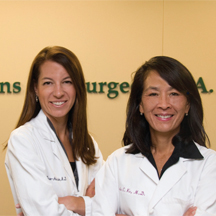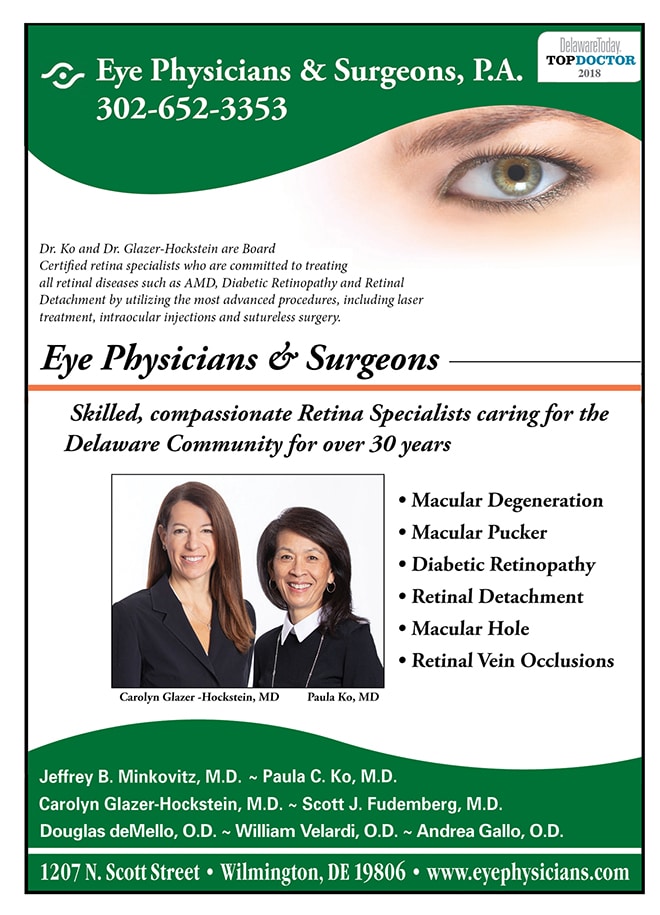More Durable & Longer Lasting Treatments
For Wet Age-Related Macular Degeneration
By Dr. Paula C. Ko, M.D.
Age-Related Macular Degeneration (ARMD) is the leading cause of blindness in Americans over the age of 65. In the last 15 years, injections have become available to successfully treat the wet form of ARMD which is characterized by leaky and bleeding blood vessels, decreasing a patient’s central vision. Although injections are a very successful treatment for wet ARMD, it requires patients to come to the retina specialist’s office every 4-12 weeks for the rest of their lives. This highly effective treatment puts a strain on patients and their families who must constantly drive to their never-ending appointments. Luckily, there are new treatment options available that last longer. Some treatments are already FDA approved and some are still in the research trial phases. With treatments lasting longer, patients are much more apt to keep up with a less burdensome treatment regimen. In turn, patients are more likely to maintain good vision throughout their lifetime.
SUSVIMO (By Genentech)
This is a port delivery system- it is surgically placed in the eye, allowing the patient to avoid monthly injections. The drug delivered is Lucentis, a successful drug for wet AMD that is already given on a monthly basis. Now Lucentis is stored in the port delivery system which is refilled every 6 months. The port is surgically placed in the eye the first time, and slowly delivers Lucentis into the eye in a controlled fashion. The port is refilled in the office by a retina specialist every 6 months. Studies show the same visual improvement outcome of multiple injections of Lucentis verses using the port delivery system, Susvimo. The risk for infection with an injection in the eye is 1 in 2000 injections, and each time someone has an injection, their risk goes up. The risk of infection in Susvimo is 3 times higher in the port delivery systems, but then they only need to refill twice a year. This delivery system would be good for someone who has issues with transportation or with someone who is getting injections every month as they would go from 12 injections a year to only 2 per year with the same good visual outcome.
VABYSMO (By Roche)
This intraocular drug was just FDA approved for diabetic macular edema as well as wet ARMD. It was compared to a very well-known drug Eylea, which works well when injections are given every 4 to 12 weeks. Vabysmo works equally well but can last even longer, up to 16 weeks. This drug is a bispecific molecule which means it works in two ways. Vabysmo blocks Vascular Endothelial Growth Factor (VEGF-inhibitor) and also blocks Angiopoietin-2 (Ang-2 inhibitor). By having 2 mechanisms of action, it is a stronger drug and it lasts longer. By decreasing the need for multiple injections, the patient is more likely to keep up with their scheduled injections and can more easily maintain better vision.
GENE THERAPY RGX-314 (by Regenxbio
& ADVM-022 (by Adverum Biotechnologies)
These drugs are still in early phase studies, but so far, found to be safe. It is a “one-time treatment” that uses an adenovirus vector that is surgically implanted underneath the retina to treat wet AMD. The adenovirus will go into the patient’s retinal cells to “program” the patient’s retinal-cell DNA to produce their own VEGF-inhibitor. The patient will basically produce their own drug that treats their wet ARMD. When a patient produces their own VEGF-inhibitor, it will decrease the amount of injections needed from the retina doctor by 70-100%. The risks and benefits of this drug are still not completely known, but its mechanism of action is a novel concept and if approved, it will truly be a break-out drug of the future!
You can follow us on facebook, instagram, and our website at www.eyephysicians.com or call 302-652-3353.
Bios
Paula Ko, MD is a proud partner at Eye Physicians and Surgeons in Wilmington and Dover, DE for the last 28 years. She started her career as an engineer at Shared Medical Systems after graduating from The Ohio State University in Computer and Information Science from the College of Engineering. Although it was an interesting career, she felt that becoming a physician would be more rewarding. Engineering taught her deductive reasoning – the ability to look at a problem, assess the situation and recommend a solution. She has applied this quality to diagnosing patients and initiating individualized treatment plans. She feels the key to diagnosing a patient is listening to a patient’s symptoms and doing a thorough exam. Although testing is important, it cannot replace an examination and an open mind by the doctor.
Dr. Ko specializes in retina surgery, caring for people with diseases like age-related macular degeneration, diabetes, vascular disease, macular holes, macular puckers, retinal tears, and retinal detachments. Many retinal diseases have successful treatments. Intraocular injections can reverse damage and improve vision in many. She performs small incision, sutureless retinal surgery. Many of her procedures can now be done in the office instead of the operating room. Dr. Ko has also been voted Top Doc by her peers in Delaware Today Magazine for multiple years.
Eye Physicians and Surgeons is a multispecialty Ophthalmology practice that has been in business for over 60 years. They take care of patients who need contacts, glasses or LASIK as well as those with multiple eye diseases that require complex surgeries. We have many longtime patients and families who have received their care at EPS for years. They keep up with innovative advances in the field of Ophthalmology, deliver high-level care, and pride themselves with a professional and compassionate staff.
Dr. Carolyn Glazer-Hockstein focuses on patients with retinal diseases, including age-related macular degeneration, diabetic retinopathy, and retinal vascular disease. Dr. Glazer-Hockstein received her medical degree from Jefferson Medical College in Philadelphia, where she graduated with honors, was elected to the Hobart Armory Hare Medical Society and Alpha Omega Alpha Medical Honor Society, and earned the Carroll R. Mullen Memorial Prize in Ophthalmology. After completing her internship at Presbyterian Medical Center, she stayed in Philadelphia to complete her residency at the Scheie Eye Institute of the University of Pennsylvania, where she was elected chief resident. She completed a medical retina fellowship at the Scheie Eye Institute.
Dr. Glazer-Hockstein practices the most up-to-date diagnostic and treatment techniques of retinal diseases including laser therapies and injections. Her research has been published in journals such as the American Journal of Ophthalmology, Journal of Musculoskeletal Medicine, and Retina. She has also presented at national and international conferences including the Asia Pacific Society of Ophthalmic Plastic and Reconstructive Surgery in Sydney, Australia, the North American Neuro-Ophthalmology Society, and the American Academy of Ophthalmology National Meeting and the Association for Research in Vision and Ophthalmology. Dr. Glazer-Hockstein was recognized as a Top Doc in ophthalmology in Delaware Today magazine for 2012, 2016, 2017, and 2018.



